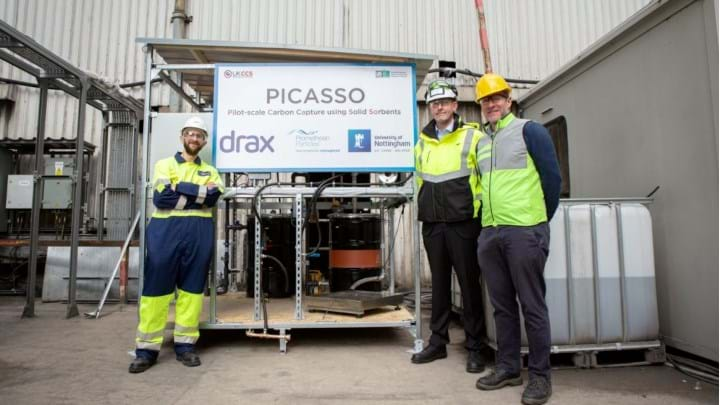Drax to trial innovative carbon capture technology

RENEWABLE energy firm Drax is working with the University of Nottingham, UK and Promethean Particles to trial new carbon capture technology installed at its North Yorkshire power station, to help the UK meet its net zero climate targets by 2050.
Dubbed PICASSO, which stands for Pilot Scale Carbon Capture using Solid Sorbents, the project aims to use metal organic framework sorbents (MOFs) — the solid sorbent part of the process — to capture CO2 from industrial flue gas. Traditional methods to capture CO2 in industrial settings have relied on amine scrubbing. This uses an aqueous solution containing several alkylamines to strip the gas of hydrogen sulfide and CO2.
However, this technique is energy intensive and comes with several challenges, both technical and logistical.
MOFs, on the other hand, involve a highly porous material made up of metal ions and organic linkers that work like a sponge or sieve to physically trap the gas.
So far their use has been limited due to cost and a sensitivity to air, but by manufacturing MOFs at scale, and using established and robust MOFs that can perform well in an industrial environment, Drax says they have the potential to become a viable and cost effective method at CO2 removal.
Jason Shipstone, Drax’s Chief Innovation Officer, said: “Negative emissions technologies like BECCS will play a vital role in the fight against the climate crisis, so it’s crucial we continue to innovate and develop new technologies that will support their future deployment.”
The trial is expected to last for two months and if successful, Drax is hoping to scale up the technology to capture hundreds to thousands of kilos of CO2 per day.
This would be the world’s largest carbon capture power project, says Drax, and could open up possibilities for other industries seeking to capture and store gases such as hydrogen.
Recent Editions
Catch up on the latest news, views and jobs from The Chemical Engineer. Below are the four latest issues. View a wider selection of the archive from within the Magazine section of this site.




